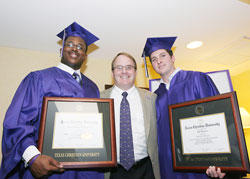TCU football has a player graduation rate 12 percent higher than the national average, a study found.According to a recent NCAA study on graduation rates, TCU is graduating an average of 78 percent of its senior football players, while the national average is 66 percent. The Horned Frogs also ranked in the top five for graduation success rates.
At TCU, student-athlete graduation rates are a top priority, head coach Gary Patterson said.
TCU football has accomplished its ahead-of-the-curve graduation rate, while at the same time, posting three seasons of 10 or more wins in the past four years.
During the 2005 and 2006 seasons, TCU finished fifth in graduation rates among teams ranked in the national top 25 polls.
Patterson said he takes pride in the football team’s graduation successes and makes it a personal point to push the importance of school to his players.
“They better go to class or they’ll run,” Patterson said.
Redshirt freshman quarterback Andy Dalton said TCU’s academics were a major reason why he chose to attend.
“Ever since recruiting, he (Patterson) talked about how high the graduation rates are here,” Dalton said.
Dalton said he believes academics should be a factor in every athlete’s school choice, and TCU’s academics probably help persuade players to attend.
Academically, Patterson said his main focus for his team is helping players get through their freshman and sophomore years.
“I don’t think they see the light at the end of the tunnel,” Patterson said. “Finally, when they get to their junior and senior years, they start to mature and they see how school is important and they get a degree.”
Senior free safety David Roach said the coaches are always pushing younger players to succeed in class.
“Your first two years, you constantly have coaches watching out for you,” Roach said. “I wouldn’t say hounding you, but they’re actually looking out for you, trying to grow you up into a man.”
Patterson said students often start school with the idea that they have it made and studying takes a back seat to athletics and social activities.
To counter the new student-athlete’s inexperience, the team implements mandatory summer school and study hours for freshmen and sophomores.
Dalton said the coaches require and monitor his study hours. He said the transition from high school to college is a big leap, but the team always offers help.
“When you first get here, college is obviously different from high school, especially when you’re playing a sport,” Dalton said.
Roach said it is important for players to drop bad habits they may have picked up in high school.
“It’s very easy to transfer things – bad mistakes,” Roach said.
Patterson said he personally keeps a record of every player’s GPA and hours as another measure to ensure his players’ success on and off the field.
By doing so, Patterson said, he does not need to rely on anyone else to keep track of his players’ progress and can look up any player at any time.
The push Patterson makes for good grades and high performance in class often leaves his players upset with him, he said.
“If they’re mad because I’ve been pushing them too hard, it usually takes them five years to come back,” Patterson said. “But they usually come back whether they like me or not and thank me.”
Junior defensive tackle Cody Moore said he has gotten to the point where he no longer needs to worry about school because he is confident in his ability to get good grades, and he thanks Patterson for helping him get there.
“I appreciate the things he does,” Moore said, “like keeping a close eye on us with the grade checks.”
Playing time is a tool Patterson uses to motivate students to study and go to class.
“The only thing coaches really have on kids is playing time,” Patterson said. “If you don’t go to class or you don’t study, then you’re not going to suit up.”
Roach said Patterson is serious about benching players if they fail to meet academic requirements.
“If you don’t get the certain amount of hours that you need for study hall, you actually will not be able to play for Coach Patterson,” Roach said.
Currently, the Horned Frogs have five players working on their master’s degrees, and 15 of the 17 seniors on the team plan to graduate in December.
Roach is working on his master’s in liberal arts and said he knew from day one that academics were a big part of TCU.
Roach said that through the years, studying and balancing his workload has gotten easier.
TCU’s 14-1 student-faculty ratio is one reason Patterson said the players have succeeded in school.
On this year’s team, Patterson said, none of his upperclassman players fell below a 2.0 GPA last semester.
Patterson said this number is even more impressive when film, practice, game plans and games are considered.
The hardest part of every year is the middle of the fall semester, Patterson said. He called it a grind that required his players to not only play the bulk of their football schedule, but also deal with midterms and all the mid-semester work required of students.
Because of the struggle many freshman players have, he said, there should be a fifth year of eligibility.
He makes it a point to redshirt first-year players or declare as many freshmen ineligible to play in games as possible.
This gives what he considers a needed adjustment time from high school to college work, Patterson said.
No matter how the team is playing, Patterson said, he is always going to make sure his players get a good education first.
“Ever since I’ve been here, it’s been academics first, football second,” Roach said.

